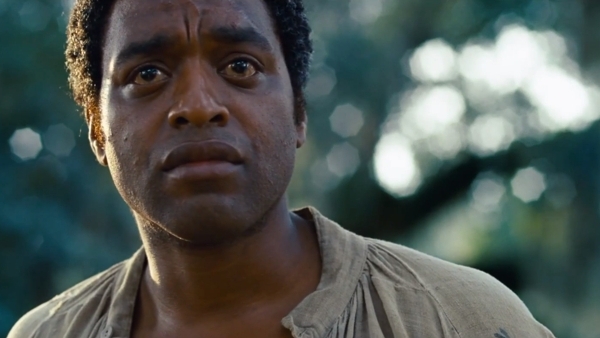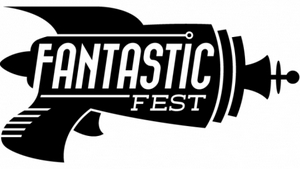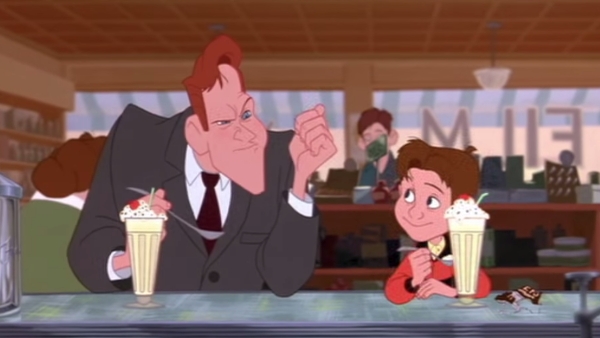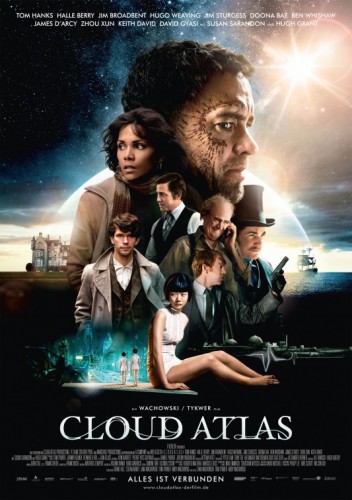 It’s fitting that Cloud Atlas, an inherently brave commercial and artistic venture, places heavy thematic emphasis on instances of human bravery in its sprawl of interwoven plot lines. Andy and Lana Wachowski haven’t built their career together by making cinema that follows traditional notions of filmmaking, after all– going back to 1999, The Matrix completely rewrote the rules of action films in terms of how they’re crafted both visually and thematically, while 2008’s Speed Racer very much defied standards of editing and storytelling in trippy, audacious ways. Taking all of that into account, Cloud Atlas might almost feel like an expected work from the Wachowskis– like the other movies of their oeuvre, it bucks convention, specifically through is approach to narrative– but more important is how that fundamental sense of courage informs both the tone and the focus of the entire film.
It’s fitting that Cloud Atlas, an inherently brave commercial and artistic venture, places heavy thematic emphasis on instances of human bravery in its sprawl of interwoven plot lines. Andy and Lana Wachowski haven’t built their career together by making cinema that follows traditional notions of filmmaking, after all– going back to 1999, The Matrix completely rewrote the rules of action films in terms of how they’re crafted both visually and thematically, while 2008’s Speed Racer very much defied standards of editing and storytelling in trippy, audacious ways. Taking all of that into account, Cloud Atlas might almost feel like an expected work from the Wachowskis– like the other movies of their oeuvre, it bucks convention, specifically through is approach to narrative– but more important is how that fundamental sense of courage informs both the tone and the focus of the entire film.
At its core, Cloud Atlas means to connect six disparate tales from six wholly different time periods for a very exact purpose; the story is about humanity’s tendency to repeat its mistakes, but told on a stage that spans vast temporal and spatial boundaries. In that particular design, the film succeeds by showing our species’ great propensity for amorality, cruelty, self-interest, and rank barbarism, particularly in service to twisted concepts of civility and progress– the sections of the picture that deal with the slave trade, for example, which the Wachowskis and Tom Tykwer later contrast against the sections that occur in a distant future where clones are manufactured, recycled, and broken down into a food supply for the clone population to consume (unaware, of course, of what they’re actually eating). In fact, taken from a different perspective, Cloud Atlas could be perceived as a catalog of humanity’s absolute worst proclivities and characteristics instead of its best merits.
Yet Cloud Atlas resoundingly answers the impacting force of its own depictions of cruelty, avarice, and ignorance with equal, opposite emotional and ideological reactions. Perhaps the film can be viewed as a portrait of mankind’s centuries-spanning malignity, but the Wachowskis and Tykwer show a clear sense of preference toward the achievements of their protagonists instead of wallowing in the venom of their antagonists. Ultimately their work comes to be defined by the respective triumphs of those classified as the “weak”– such as Zachry, Adam Ewing, Sonmi~451, and Robert Frobisher– over the “strong”– such as Bill Smoke, Vyvyan Ayrs, and Nurse Noakes.
The series of victories that unfold in the film’s sequence of climaxes as each story arrives at its respective conclusion directly oppose the philosophy espoused by Henry Goose. “The weak are meat, and the strong do eat,” the duplicitous, rapacious doctor sinisterly quips as his true intentions with Ewing, allegedly under Goose’s care, come to light towards Cloud Atlas‘s end. He’s clearly not the only heavy in the movie who supports this notion; its strongest and most literal proponent can easily be identified as the merciless chieftain of the cannibal tribe, but in every timeline there exists a character who exhibits a deep-rooted belief in that exact concept. Ayrs, for example, believes that his position and exultation in the public eye gives him power over Frobisher, and so the aging composer attempts to blackmail the younger man into surrendering his masterpiece sextet.
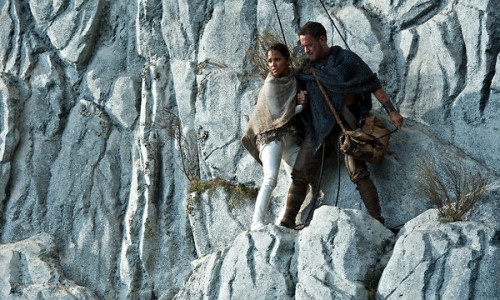
But Frobisher resists and eventually overcomes his oppressor, and just as he does, so too do the rest of the film’s characters. Zachry slays the cannibal chieftain, and with the help of Meronym destroys the rest of his clan; Ewing, aided by Autua, survives Goose’s underhanded, devious assassination attempt; Timothy Cavendish escapes from his prison at the nursing home with the assistance of his three friends; Sonmi and the rebels who persuaded her to their cause manage to transmit their message of truth to the greater populace; Luisa Rey publishes her report exposing Lloyd Hooks’ conspiratorial crimes. The act of the powerless toppling the powerful serves as Cloud Atlas‘s primary through-line and provides it with a connective tissue which links its various parables together.
Bravery represents the film’s focal point and gives it a soul: the meek, no matter their circumstances, possess the strength and will to best the tyrants and persecutors of their lives, and in some cases literally overthrow their demons to do the right thing. Nestled within Cloud Atlas‘s advocacy for the disempowered, though, lie other thematic elements that greatly inform the displays of mettle showcased from one story to the next. Cloud Atlas‘s sextet of climaxes aren’t defined by a single lone common denominator; they depict the weak defeating the strong, but nearly every such instance of success is attained through the joint efforts of two or more people fighting for the same thing. Without Zachry, Meronym’s quest would surely have failed, and without Meronym, the Kona would surely have killed Zachry and his niece; robbed of Autua’s intervention, Ewing would have succumbed to Goose’s vile medicines.
There’s a common denominator in each of these scenarios: Cloud Atlas‘s protagonists do not overpower their nemeses on their own. Quite the opposite, actually– they almost universally receive assistance from others in their various journeys and adventures. In a way, this recurring circumstance perhaps affirms the odious assertions made of their perceived frailty, but it actually supplies Cloud Atlas with two additional through-lines of morality and compassion, which in turn informs the film’s inclination to champion the weak and each portrayal of people risking their comfort, their safety, and their very lives to help another further defines it as a humanist work of art.
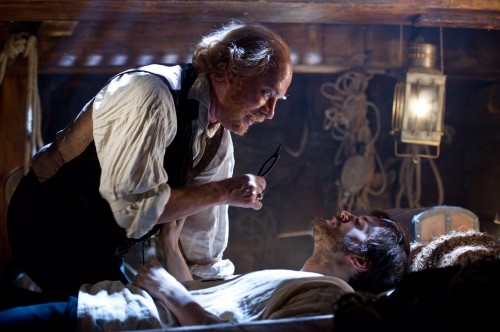
Because in the end, Cloud Atlas isn’t just about people being intrepid only within context of themselves, and it’s not just about demonstrations of benevolence and empathy. Rather, it’s about how all three of these emotions and senses intersect with one another and come to comprise the fabric of the entire film. We could peg Cloud Atlas as a film about any single one of these motifs, and we’d be correct, but would Luisa Rey have managed to persevere through the attempts made on her life as well as the obstacles placed in her path by Smoke and Hooks without the intervention of Joe Napier? If not for Hae-joo Chang, could Sonmi~451 have avoided her initially scheduled execution– and if not for Sonmi~451, could Chang and his cohorts have transmitted their urgent communication?
Cloud Atlas‘s events unfold as they do by virtue of human cooperation. Perhaps this is something of a generic comment, and one which can be made about any number of films throughout the medium’s history. Few, however, make such a strong point about the necessity of the selflessness and altruism the characters of each story show one another. That’s because Cloud Atlas underscores that the links which bind our species together are made up of more than what we see or what we observe (e.g., Ewing’s story bleeds into Frobisher’s courtesy of the former’s journal; Frobisher’s story bleeds into Rey’s courtesy of the letters the former wrote to his lover, Sixsmith, whom Rey meets at the start of her narrative, etc). Their strongest foundation very much lies in the actions we as individuals take toward one another.
In other words, we’re bonded through interaction instead of an inexplicable perception of familiarity. Zachry and Meronym do not develop a sense of kinship between one another because they happened to bump into each in another life (as Tom Hanks and Halle Berry, playing the former and latter roles respectively, share the screen with one another in the segment featuring Rey’s thriller adventure), but because in the present they work together to vanquish their common foes and make it to the Cloud Atlas station settled deep within the mountains. So our species is interconnected thanks to our deeds, and in Cloud Atlas the most significant deeds of the plot are those performed in the spirit of brotherhood, kindness, humanitarianism, and altruism; in those elements, the film suggests that we’ll be better-remembered for the good we do than the harm we inflict.
